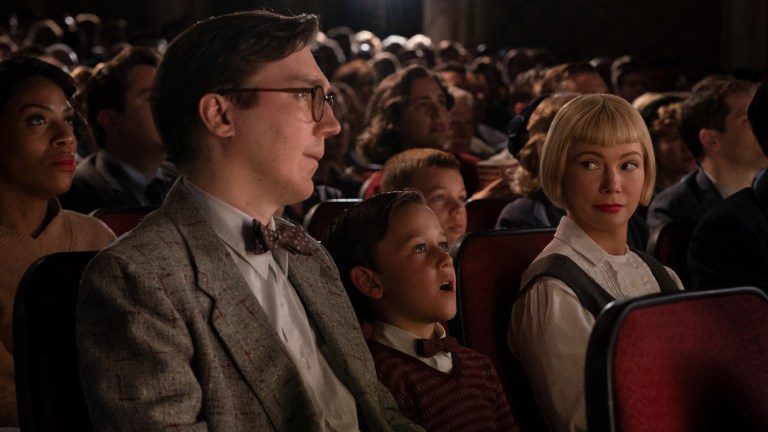The Fabelmans: Steven Spielberg Looks at Forces That Made One of the Greatest Filmmakers
Steven Spielberg remembers how he became a filmmaker in this poignant ode to his childhood.

The odd thing about The Fabelmans, Steven Spielberg’s thinly fictionalized account of his childhood, adolescence, and family upbringing—the factors that ultimately shaped him into one of our greatest directors—is that it’s not really about Spielberg’s screen avatar, young Sammy Fabelman (played by Mateo Zoryon Francis-DeFord as a little boy and uncanny Spielberg lookalike Gabriel LaBelle as a teenager). For most of its 150-minute running time, the central character is Mitzi, Sammy’s mother, played as a force of nature by Michelle Williams in a towering tour de force performance.
Mitzi has an artistic, free-flowing soul and heart, but she’s trapped in the everyday routine of being a suburban homemaker with four kids and a dutiful, devoted, workaholic husband, Burt (played by Paul Dano). Burt’s not completely closed off but doesn’t exhibit much passion, even for his work, which is essentially helping to create the modern computer. He lacks his wife’s effervescent joie de vivre. The difference between Mitzi and Burt is made apparent in the opening moments of the movie when they take Sammy in 1952 to see his first movie, Cecil B. DeMille’s charmingly schlocky Best Picture winner, The Greatest Show on Earth. Sammy is knocked out, awed, even a little frightened. Afterward, Burt patiently explains the nuts and bolts of the filmmaking process to his rattled son while Mitzi is more direct, describing films as “dreams.”
Mitzi has dreams too, and flights of fancy, and acts impulsively in ways that today might get her scrutinized by a psychiatrist or tethered to all kinds of medication. But she is still tied down to the life she has here, and keeps pulling against that life, ultimately making decisions that send her family, which includes Sammy’s three younger sisters, into a tailspin. Yet these are the things that she needs to do to survive.
Another filmmaker might make Mitzi the villain of the piece; not so here. Spielberg treats both his screen mother and father with kindness, and all the while little Sammy, inspired by that first movie theater experience to start making moving pictures of his own, escapes into his own world, gradually realizing that films are dreams, albeit dreams that one can control and fashion any way one wants. It’s his calling, fueled by both the technical expertise of his dad and the wildfire imagination of his mom. His father is impressed but upset when Sammy crashes an expensive train set in his first attempt at shooting a movie on 8mm; his mother is enthralled by it.
Don’t come to The Fabelmans expecting to see how Spielberg created Jaws or what inspired Close Encounters of the Third Kind (although we kind of wish we had seen a little of Sammy making his/Spielberg’s 8mm UFO epic “Firelight,“ made when he was just 17 years old). We do see Sammy making movies all along, and we marvel at how proficient he gets every time out and how he becomes a commanding presence to both his ad hoc crews and casts. Even as a teen, he knows what he wants to see and how to get it. But this is about the circumstances and dynamics that led him there, and it’s much more of an intimate family drama than a treatise on the power of cinema.
But it’s absorbing and moving nonetheless, even if the script (penned by Spielberg and Tony Kushner in their fourth collaboration following Munich, Lincoln, and West Side Story) is a bit rambling and episodic, as pics of this general nature tend to be. Burt’s work forces the family to keep relocating until they finally settle in northern California where a now-teenage Sammy encounters antisemitism, bullying, and his first kiss, ironically delivered by a rather randy Born Again Christian girl named Monica (Chloe East). It’s also in northern California where Sammy’s unresolved issues with his mom—triggered by of all things a film he makes to comfort her after her mother’s death—come to a boil, leading to confrontations that feel painfully raw and real.
It doesn’t feel like Spielberg is pulling his punches here, and in fact the entire film is frank about each member of the Fabelman family while not casting judgment on anyone. Even Sammy has his moments of selfishness and pettiness (Spielberg doesn’t come anywhere near canonizing his screen self). In the end, each member of the little clan has to find their way forward through disappointment and hurt. “Sometimes you can’t fix things,” Sammy is told late in the movie. “You just have to suffer.”
While Williams as Mitzi is the gravitational center of the movie—as in real life, the mom is the sun around which all the other family members orbit—LaBelle is affecting as Sammy, and Dano is excellent as Burt, a decent, compassionate man who swallows his emotions to be the unyielding rock of his family. His sacrifices throughout the film are quietly heartbreaking. The two other striking appearances in the film are that of a scene-stealing Judd Hirsch, as a visiting uncle who has worked in the film business and has some poignant remarks to Sammy, and one of our most free-spirited real-life directors as a crotchety filmmaking legend who dispenses a kernel of wisdom to Sammy at a crucial moment.
Technical mastery and human emotion have always been the driving forces of filmmaking. Perhaps no one has personified the push-and-pull between those (as well as, frankly, heavy-handed sentiment) than Steven Spielberg, the filmmaker of one astonishing masterpiece after another, and with few failures in between. The Fabelmans shows us where it all started, and whatever forces did end up shaping one of our greatest filmmakers, we’re glad that he shared them with us through his long, legendary career.
The Fabelmans is out now in nationwide release.
